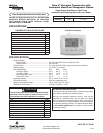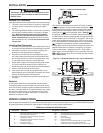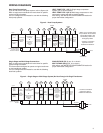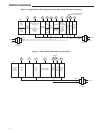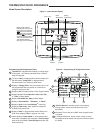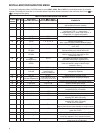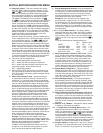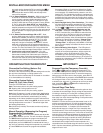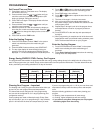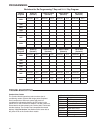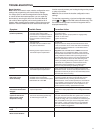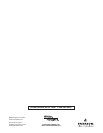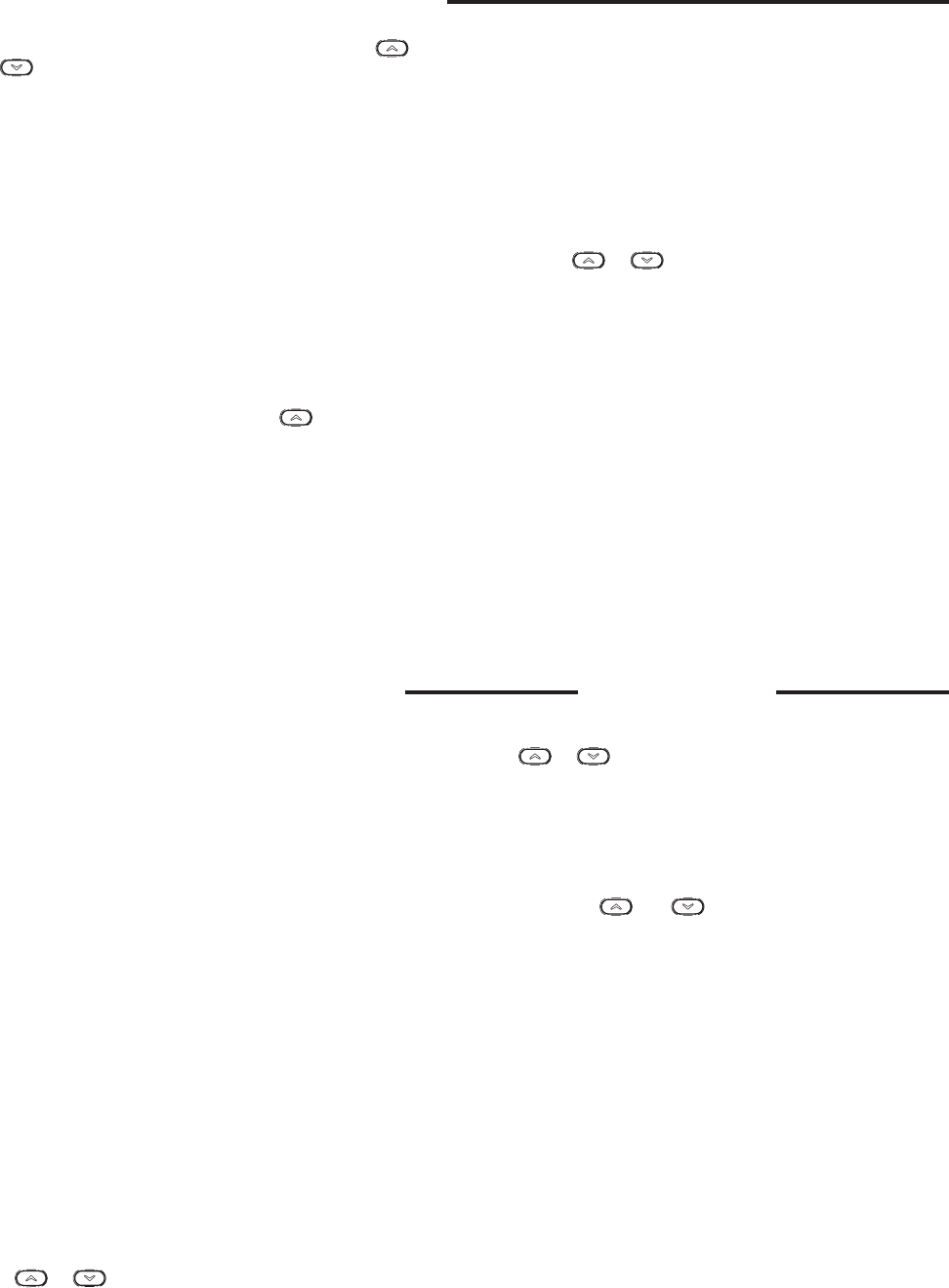
8
INSTALLER/CONFIGURATION MENU
per week can be changed to P3 by pressing the or
keys. A selection of 0 Days for non-programmable
will eliminate the need for EMR, and that step in the
menu will be skipped.
19 & 20) Select Automatic Schedule – With just one touch
of the AUTO SCHEDULE button this feature allows
you to program a desired comfort temperature into all
the program periods along with a 6° set back for night
periods of both Heat and Cool programs. Factory default
is “On” for both. When Heat AS On and Cool AS On
are activated while in Heat or Cool mode, select desired
setpoint temperature and press AUTO SCHEDULE. This
value will be copied into all the morning, day and evening
program periods. The night program periods will have a
6°F set back.
21 & 22) Select Fast Second Stage ON or OFF – Heat
pump or Multi-stage only, in the run mode, with the fast
Heat feature enabled (FA Heat On), if the Heat setpoint
temperature is manually raised by 3°F (2°C) or more
above the actual temperature using
the second
stage will energize immediately. With FA OFF, second
stage will not energize until the setpoint temperature is
1°F or more above actual temperature for more than ten
minutes. The Fast Cool feature (FA Cool) provides the
same controls when the setpoint temperature is lowered.
23) Comfort Alert with Active Protection – Turn this
feature ON to enable active protection. This allows the
thermostat to identify fault codes sent by the Comfort
Alert module when compressor damage is possible and
react to those codes by turning the compressor off. Fault
codes from the Comfort Alert module will flash on the
thermostat. (Refer to Comfort Alert Yellow Alert Codes
in Troubleshooting section.) If a Comfort Alert module is
not connected, or to disable active protection, turn this
feature OFF. If a Comfort Alert module is connected and
this feature is turned OFF, the thermostat will still receive
and flash the fault codes from the Comfort Alert module,
but the active protection will not be enabled to protect the
compressor.
24) Select Daylight Saving Time Calculation – This feature
will allow the thermostat to calculate the DST automati-
cally and apply it to the Real Time Clock display. Default
On. Use
or buttons to select the feature OFF.
25 & 26) Select Filter Replacement Reminder and Set
Run Time – Select the “Change Filter” reminder On
or OFF. If selected On, press MENU to select the time
period from 25 to 1975 hours in 25 hours increments.
In a typical system, 200 hours (default) of run time is
approximately 30 days. After the selected time of blower
operation, the thermostat will display “Change Filter”
as a reminder to change or clean your air filter. When
“Change Filter” is displayed, press MENU or RUN but-
ton to clear the display and restart the time to the next
filter change.
27) Select Reversing Valve Output – The O/B option is
factory set at “O” position. This will accommodate the
majority of heat pump applications, which require the
changeover relay to be energized in COOL. If the
thermostat you are replacing or the heat pump being
installed with this thermostat requires a “B” terminal, to
energize the changeover relay in HEAT, the O/B option
should be set at “B” position.
OPERATING YOUR THERMOSTAT
Choose the Fan Setting (Auto or On)
Press the FAN button to Auto or On.
Fan Auto is the most commonly selected setting and runs the
fan only when the heating or cooling system is on.
Fan On runs the fan continuously for increased air circulation
or to allow additional air cleaning.
Choose the System Setting
(Heat, Off, Cool, Auto, Emer)
Press the SYSTEM button to select:
Heat: Thermostat controls only the heating system.
Off: Heating and Cooling systems are off.
Cool: Thermostat controls only the cooling system.
Auto: Auto Changeover is used in areas where both heating
and cooling may be required on the same day. AUTO allows
the thermostat to automatically select heating or cooling
depending on the indoor temperature and the selected heat
and cool temperatures. When using AUTO, be sure to set the
Cooling temperatures more than 1° Fahrenheit higher than
the heating temperature.
Em: (Heat Pump models) Thermostat controls only backup
heating system.
Manual Operation (Bypassing the Program)
Programmable Thermostats
Press or and then the HOLD button and adjust the
temperature wherever you like. This will override the program.
The HOLD feature bypasses the program and allows you
to adjust the temperature manually, as needed. Whatever
temperature you set in HOLD will be maintained 24 hours a
day, until you manually change the temperature or press RUN
to cancel HOLD and resume the programmed schedule.
IMPORTANT!
Program Override (Temporary Override)
Press or buttons to adjust the temperature. This
will override the temperature setting for two hours minimum
or until the next programmed time. To cancel the temporary
setting at any time and return to the program, press RUN. If
the SYSTEM button is pressed to select AUTO the thermostat
will change to Heat or Cool, whichever ran last. If it switches
to heat but you want cool, or it changes to cool but you want
heat, press both
and buttons simultaneously to
change to the other mode.
Second Stage Time Delay
Your thermostat is designed to determine the optimum time
to activate the second stage. Simply raising the temperature
in heating or lowering it in cooling will not always force the
thermostat to bring the second stage on quickly. There is a
time delay from 0-30 minutes depending on the performance
of the first stage of the system.
EXAMPLE: For the last 2 hours the thermostat is set on 70°
and the room temperature is 70° with the equipment using
only the first stage of heat. Since the equipment is keeping
the temperature within 1° of setpoint, the thermostat will
delay second stage for a longer time if you manually raise
the temperature or if the room temperature quickly changes.
Once the second stage comes on, it will come on sooner the
next time there is a difference between the setpoint and the
room temperature. The net effect of the staging program is
that when the first stage is capable of making temperature
the second stage will delay longer. When the thermostat
calculates that first stage cannot make temperature in a
reasonable time, the second stage will come on sooner. This
built in function automatically optimizes the use of additional
stages of heat or cool.



